Neil Peart: The Life and Legacy of the Professor


Music history will never forget Neil Peart, the renowned drummer, lyricist, and novelist. He is best known for being the drummer and lyricist for the progressive rock band Rush, which he joined in 1974 and toured with until 2015. Known for his intricate rhythms, dazzling solos, and cutting-edge techniques, Peart is one of the greatest drummers ever.
Early Life and Career
Neil Peart was born on September 12, 1952, in Hamilton, Ontario, Canada. His parents lived on a dairy farm. Much of his young life was spent working as a farm equipment parts manager for his father, Glen Peart, in St. Catharines, Ontario.
“The dimly lit barn, redolent of straw and cow manure, was an early imprint, and later in life a dairy farm always seemed to smell like “home.” Wherever I traveled, from Switzerland to Senegal, my deepest memories were triggered by … cow dung.”
Neil Peart, Traveling Music, p. 49
Peart began playing drum lessons at age 13 and was heavily influenced by jazz greats such as Gene Krupa and Buddy Rich. He played in several bands during his teenage years and eventually joined the Canadian rock band Rush in 1974.
Before landing the gig, Neil would need help finding his place in the music world, playing and touring locally with bands from his hometown, most notably J.R. Flood. Peart would leave high school early to pursue his musical ambitions. He promised his parents he would return to school if it didn’t work out.
In June of 1971, Peart moved overseas to London, England, to chase his dream. Shipping his drums would take more than a month, and in the meantime, he would try to find gigs with bands of his favorite record labels.
“I had arrived with $200 to live on … and it was getting low. I had become well acquainted with the London Transport system as I rambled through my list of record companies and management agencies, but I hadn’t found any opportunities or any promising “drummer wanted” ads in the music papers. I decided not to waste my dwindling resources, but just try to wait until my drums arrived, and something would come up.”
Neil Peart, Traveling Music, p. 205
After exhausting his resources, Peart found a gig working for a store called “Gear” on Carnaby Street. During this time, Neil tried his time in two groups: English Rose and Heaven — though neither ended working out for him, as we all know. By December, Neil felt let down and decided to return home to St. Catherines.
“By the end of 1972, I was becoming disillusioned. Having grown up a lot in those eighteen months, supporting myself, working for a living, knocking around the small-time London music world without success (or notice!), I had learned a little more about how the world worked. Even if I “got good,” it didn’t mean I was going to be successful, and the choice seemed to lie between playing good music and starving, or making a poor living playing bad music. Once again, life seemed to be standing still, and I was feeling that itch again. Now what? A “dear John” letter from my girlfriend back home helped make up my mind, and by Christmas I was back in St. Catharines with my drums and records.”
Neil Peart, Traveling Music, p. 223
In 1973, now back home, Neil became the parts manager for his father’s store, Dalziel Equipment. Around this time, Rush released their single, “Not Fade Away.” In March of ’74, Rush decided to release their debut album on their label, Moon Records, after being rejected by every record label they approached.
“When we were starting, no record company in Canada would touch us, and the only way we could get a record released was by putting it out ourselves on an independent label, which is pretty pathetic when you think about us being the biggest band Canada has produced. It makes you a little bit cynical about the whole thing.”
Neil Peart, Sounds, April 5, 1980
After releasing their debut, Rush’s first drummer, John Rutsey, decided to part ways with the band. They needed a drummer. Rush’s co-manager Vic Wilson visited Neil Peart at the parts store where he worked for his father. Glen Peart reflects on Neil being approached by Rush to audition.
“Neil had joined a small local band playing only on weekends. Somehow, his reputation had gotten around. The “White Corvette” visit to our farm equipment dealership has been documented several times. After lunch when the two men left, I could tell that Neil was really tormented. He was certainly not himself.”
“When we locked the door, he came and sat in my office and unloaded. The two visitors were the managers of Rush, a band from Toronto that were about to hit the big time. They had signed a contract and their first tour was arranged but their drummer had just dropped a bomb on all their plans — for health reasons, he had been told not to travel. The managers wanted Neil to audition ASAP and, if successful, to join the other two guys and start to practice — immediately!”
“Neil was consumed with guilt because we were just coming into our busy season and he felt he was letting me down. I finally said, ‘Neil, this could be the chance of your life. We have to talk this over your mother when we get home, but I feel you have to do this. It could be a dream come true and if it doesn’t work out, there will still be a Parts Department that can use you!’ Obviously, Mom agreed with my thoughts and the rest is history!”
Glen Peart, Farm Equipment
Neil got the gig. Alex Lifeson recounts the story of Neil’s audition in a Rolling Stone interview from 2008.
“The car pulls up, and there’s all kinds of drums tied down to it, and this real tall, skinny guy comes out with really short hair,” Lifeson recalls of Peart’s entrance. “And we were so cool in satin pants and platform shoes and long hair and all that stuff, so I was thinking, ‘Oh, this isn’t going to work out at all.’
“Suddenly, he’s playing all these triplets with his feet,” says Lee. “And I looked at Alex, and Alex looked at me, and we’re like, ‘Uhhh.’ You know in 30 seconds this is not a normal drummer here.”
Alex Lifeson, Rolling Stone
Playing with Rush
Peart made his Rush debut in 1975 with the release of the album “Fly by Night.” He rapidly cemented his place as a vital member of the group. The sound of the band was defined by his intricate drum fills and complicated rhythms, while his lyrics were praised for their profundity of thought and philosophical concerns.
On the band’s iconic albums like “2112,” “A Farewell to Kings,” and “Hemispheres,” which highlighted his interest in science fiction, philosophy, and mythology, Peart’s lyrical skill was particularly audible.
The band’s popularity was also significantly influenced by Peart’s drumming abilities. He was renowned for using polyrhythms, large drum kits, and intricate time signatures. He played on various drum brands, including Ludwig, Tama, and DW. Moreover, Peart was well-known for his extravagant drum kit arrangements, which frequently featured many drums and percussion instruments, including chimes, concert toms, temple blocks, glockenspiel, and even crotales.
Neil Peart’s Drum Kits
Take a trip through history exploring Neil Peart’s drum kits in the web story below.
Albums and Tours
Peart was a member of Rush from 1975’s “Fly by Night” through 2012’s “Clockwork Angels,” contributing to 18 studio albums. In addition, he contributed to several anthologies and live recordings. Blues and hard rock largely influenced early records by the group, but they gradually veered toward a more progressive and experimental style.
The 1976 release of Rush’s “2112” album was one of their most well-liked. The album was a conceptual work that depicted a dystopian future run by an oppressive government that stifles creativity and individuality.
Other notable Rush albums include “Moving Pictures” (1981), which featured the hit singles “Tom Sawyer” and “Limelight,” and “Signals” (1982), which saw the band incorporate more synthesizers into their sound.
Rush was renowned for its spectacular theatrical performances, which featured complex lighting and visual effects. Peart’s drum solos, which frequently combined jazz, Latin, and African music elements, were always a highlight of their live performances. The setlists for the band’s tours were notoriously long and intricate and frequently contained songs that had not been performed live in a very long time.
Personal Tragedy and Return to Music
In the 1990s, Peart endured two heartbreaking setbacks. His 19-year-old daughter Selena was fatally injured in a vehicle accident in 1997. His wife Jackie received a terminal cancer diagnosis soon after and passed away a year later.
Peart was deeply affected by the deaths of his wife and daughter and entered a period of self-imposed seclusion. He made extended motorbike trips in search of comfort and to help him cope with his loss.
Peart talked about his difficulties in coming to terms with his losses and discovering a means to move on in his book “Ghost Rider: Travels on the Healing Road.” In it, he details his 55,000-mile trip around North America by motorcycle.
Peart felt the draw of music again after a few years. Rush’s “Vapor Trails,” their first album in six years, was recorded when he rejoined the band in 2001. Peart had a victorious comeback with the album, which critics and fans highly welcomed.
On “Vapor Trails,” Peart’s drumming was more subdued than on some of Rush’s earlier albums, but it was still very proficient and creative. “One Little Victory,” the album’s first song, opened with a thunderous drum intro that immediately established Peart’s return to form.
Throughout the following decade, Peart continued to collaborate with Rush on recordings and tours, contributing to albums like “Clockwork Angels” and “Snakes & Arrows” (2012). In addition, he continued to pursue interests aside from music, such as his love of literature and his ardor for motorcycles.
Illness and Death
Rush revealed in 2015 that they would be starting the “R40” tour to commemorate their 40th year as a band. As the band’s farewell tour, the tour turned out to be an emotional and triumphant farewell for fans.
Peart was diagnosed with glioblastoma, an aggressive type of brain cancer, shortly after the tour. He stopped making music and concentrated on improving his health, but he tragically passed away on January 7, 2020, at 67. As a private person, Neil never disclosed his sickness to the public.
Rush fans and the music industry suffered greatly from Peart’s passing. He enormously impacted drumming and songwriting, and his inventiveness and enthusiasm touched the hearts of numerous musicians and fans. In addition to his musical prowess, he was admired for his intelligence, sense of humor, and friendliness.
Legacy
Peart’s music, writing, and impact on other musicians all contribute to his lasting legacy. He still influences drummers worldwide and was honored at the Modern Drummer Hall of Fame in 2020.
In addition to being a talented musician, Peart was a published author who wrote several books about his travels and musical experiences. His writing was praised for its poetic sensibility, wit, and eloquence.
It is impossible to overestimate Peart’s impact on Rush and rock music. His songwriting and drumming were essential to the band’s style, and his openness to trying new things and pushing the envelope influenced the development of the progressive rock subgenre. He will always be regarded as among the all-time great drummers and a performer who had an enduring impression on the music industry.
Peart’s fans, who are still motivated by his music, his writing, and his example, are also part of his legacy. Several followers give Peart credit for encouraging them to follow their creative hobbies or get them through challenging times.
It was a sad moment for drummers around the world as we lost drumming icon Neil Peart. Neil passed away earlier on January 7, 2020 after a three-year-long battle with brain cancer. The Rush official Instagram account posted this statement following his death.
Neil’s drumming and lyricism have impacted multiple generations of drummers across the globe over the years. I have no doubt his legacy will live on for many decades to come. Neil is survived his wife Carrie and daughter Olivia.
As a kid growing up, my late-uncle borrowed me four Rush albums, all of which I still enjoy listening. The music undoubtedly changed the course of my perspective on drums and percussion.
I was only able to attend three concerts nearing the end of Rush’s career, but they are moments I will remember for the rest of my life.
Support for Neil Peart Rang Loudly in the Music Community
During the days following the news of Neil’s passing, the music community flooded social media with support — a level at which I haven’t seen in a long time for a passing icon.
Here is a just a small handful.
My heart is broken, even knowing that this day would eventually dawn. Bubba fought hard for 3 long years, which for most would be an impossible feat. He displayed that every night plying his trade on stage, and his off days on his trusted BMW motorcycle. Love you brother! 💔 https://t.co/7Xi2I0537k
— Lorne(Gump)Wheaton (@Lornewheaton) January 11, 2020
“The measure of a life is a measure of love and respect.”—Neil Peart (1952-2020). So much love and respect to you, my friend.
— Kevin J Anderson (@TheKJA) January 11, 2020
Still numb and in disbelief…but the outpouring of posts on social media has been absolutely incredible. Honestly I don’t think I’ve ever seen so many tributes to a passing musician like this…which speaks volumes… https://t.co/RWy36aq0CX
— Mike Portnoy 🤘 (@MikePortnoy) January 11, 2020
R.I.P. Neil. No words. This is heartbreaking. What a giant. His legacy will live forever. @ Westlake, Westlake Village https://t.co/NNNP70327U
— Thomas Lang (@thomaslangdrum) January 10, 2020
RIP pal. A day I will never forget as long as I live.https://t.co/gff2kIVZ2Q
— Bubbles (@MSmithBubbles) January 10, 2020
This is a sad, sad day for drumming and the music world. One of the greatest ever has left us. Neil Peart, Rest In Peace. And thank you for your enormous gift to us. 🙏
— Vinnie Colaiuta (@vinniecolaiuta) January 10, 2020
This article originally dealt with the criticism of Neil being the most overrated drummer of all time and my defense of his playing. I have since updated it to reflect the news of his passing and included more about Peart’s life and legacy.
Online Critics Seem to Hate Neil
Neil Peart, adored by many drummers and non-drummers alike, has been criticized for being the world’s most overrated drummer of all time.
It’s so bad that I’m almost afraid to state that I like him and enjoy his playing publicly for fear of scrutiny. However, I believe he is one of the best drummers ever—key point: one of.
Could he be a bit overrated? Certainly. But we as drummers should not associate ourselves with badmouthing someone simply because of their status in the world, mainly when the one in question isn’t boasting.
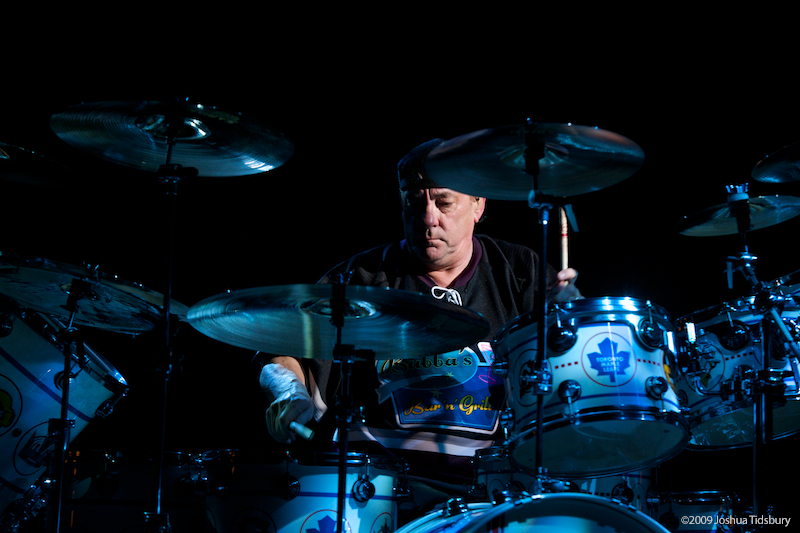
Neil has had such a substantial impact on the drumming community that I even included two of his drum parts from Moving Pictures in my songs with drum solos roundup article.
I read one piece recently that annoyed me lately.
The post’s author had based their entire opinion of Neil Peart being overrated simply because of the music Rush made and how he didn’t like it (I’m not going to link to them, but you can find it easily with Google).
The author of the piece was upset because Ian Worrall wrote a separate article on a list of his favorite 30 drummers; Neil Peart was number one on the list.
Now before going further, yes, Neil has been at the top of many lists, similar to John Bonham and Keith Moon. These three are some of the last remaining big-name drummers who rose to popularity in popular culture before social media.
Forums of Critics
A simple Google search of the query “Neil Peart Overrated” brings you to a list of forums with users complaining about how Neil’s groove sucks or how he has no feel when he plays.
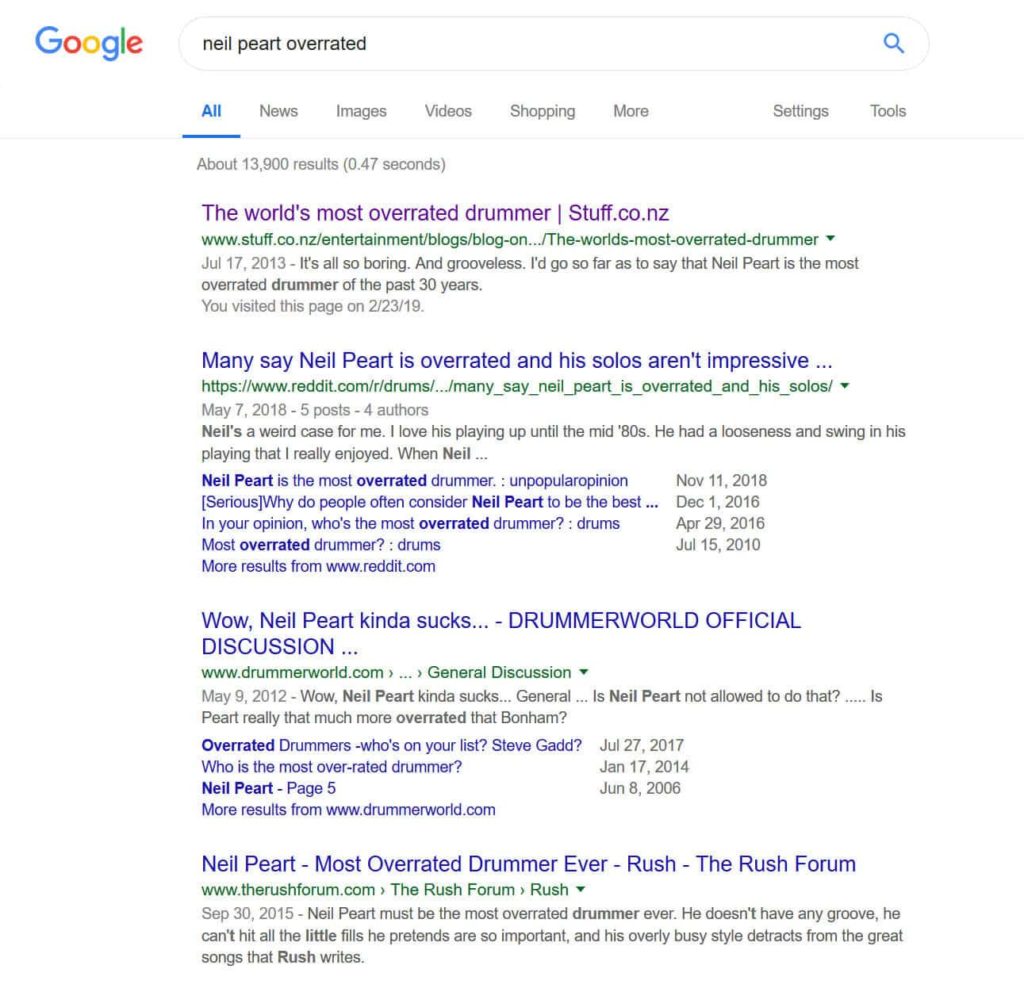
Now Neil might not be Steve Gadd, but that makes him unique. There isn’t anyone who sounds similar to him.
Despite receiving many awards and honors from notable magazines like Modern Drummer and DRUM! Magazine, this opinion still has manifested and most likely won’t recede.
Why is this? Because he happened to be in a moderately popular band (in terms of mainstream culture) that featured drumming far beyond that of the standard rock drummer in terms of precision and prowess.
On albums, he’d use intricate drum fills (deemed unnecessary by drumming elites) and polyrhythms within different time signatures, and he even was distinguishable by his signature ride pattern. But, of course, that’s just scratching the surface.
Whining Over a Popularity Contest
Being overrated doesn’t mean much. If enough people know about you, more people will talk about you. In Neil’s case, he is a very popular drummer outside the drumming and drummers niche. As a result, he was able to transcend into popular culture, especially in Rush’s later years.
No matter how much I love Dave Weckl or Bernard Purdie, there’s a good chance that none of my friends will have heard of them before. Is this bad? Of course not.
Let’s take a look at some of the criticism.
Neil Peart Sucks …at playing jazz!
This one did make me chuckle a little bit.

While I love Neil and his playing, it is clear to me and many others that jazz drumming was not his forte.
That being said, I commend him for studying with many great teachers to learn jazz and for his honor in the art form.
The Burning For Buddy events were fantastic tributes to the one and only Buddy Rich. It took a lot of gusto to get up on stage with his big band players and perform when it’s something you aren’t the most comfortable with.
Neil’s Playing Has No Groove
You don’t have to understand Rush to listen to Neil’s playing objectively. There may not be a groove with Neil in the sense of someone like Bernard Purdie, but again, these are two different styles of playing.

For the first twenty years of Neil’s career, there wasn’t a remote control spinning kit or loads of percussion samples; bells and whistles can’t be the only argument to make against his playing beside his groove.
Neil as a Drummer and Lyricist
Neil joined up with Rush on their second studio album. His playing was decent but nowhere near where it would be just a few years later.
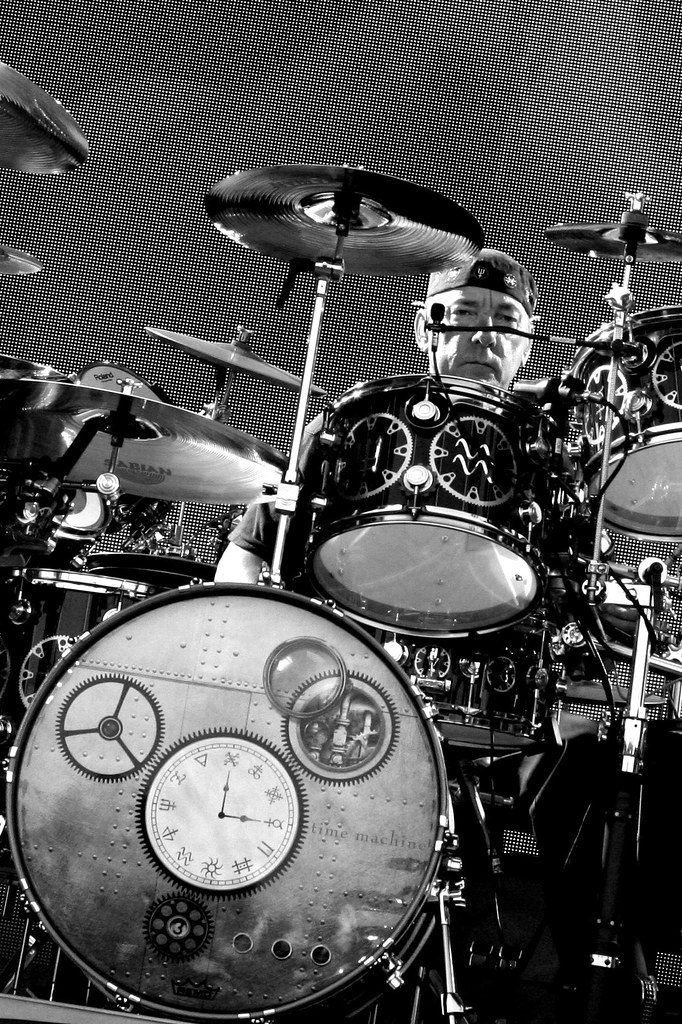
He has written and performed countless parts that drummers of all ages and skill levels have emulated. So saying that he isn’t a massive inspiration to a whole generation of drummers would be false.
I love Rush lyrics. They resonate with me in a way simple pop music lyrics cannot. I like reading exciting things that provoke thought, not cookie-cutter ideas for simple minds.
Neil Peart’s Drum Set Size
As Rush progressed creatively, so did Neil’s kit in size. As the years passed, Neil began amassing extra pieces to his setup. There were cowbells, timbales, tubular bells, temple blocks, and much more.
Neil’s kit size has always been a point of contention between drummers. At one time, it was acceptable to have a big kit with lots of additional percussion. Today? Not so much.
The image above visually represents one of Neil’s drum kits from the early 80s. Then, it was common for him to use percussion like concert toms, crotales, temple blocks, chimes, and gong drums.
Bigger kits are fantastic. It makes you far more unique as a drummer with different types of percussion. For example, Thom Sonny Green, from Alt J, uses extra percussion with his kit and no cymbals.
Sure, his kit isn’t massive, but the unique quality is there. How boring is it to play the same setup?
His Charisma, Pride, and Integrity
There is a level of charisma that Neil emanates. You can tell that he is genuine and always strives to become a better drummer.
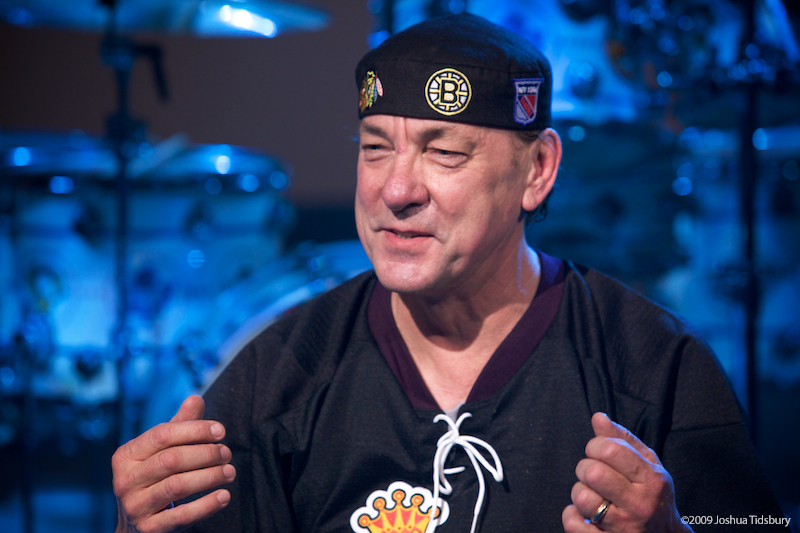
His sense of pride and integrity was also incredibly inspiring to me as a young drummer. These three things trump his playing and technical ability altogether. Nevertheless, they are the reasons I chose to learn from him and why I was initially so impressed with him as a drummer in a band.
Level of Endurance
Whether you like him or not, Neil had incredible endurance. Playing three hours of Rush tunes every night could not have been easy. You can’t say the same about the cocky arrogance of others. I think this is partly why Neil had to retire from drumming. It’s a lot on one physically.
The Fanboys
Let’s talk about the elephant in the room: drummers are obsessed with NP. I’ll admit, I am, well, sort of was. There was a time when I thought there was no greater drummer on the planet. But times have changed, and I have moved past that belief.
Don’t get me wrong — my admiration for Neil is immense, so much so that I’d say he’s had the most significant impact on me as a player. However, I also love the music Rush made over the years, except for Tai Shan (sorry Neil).
However, there remains to be a loud, vocal minority of drummers and Rush fans who become irate at the notion that there may be some better players out there than Pratt.
This meme sums it up perfectly.
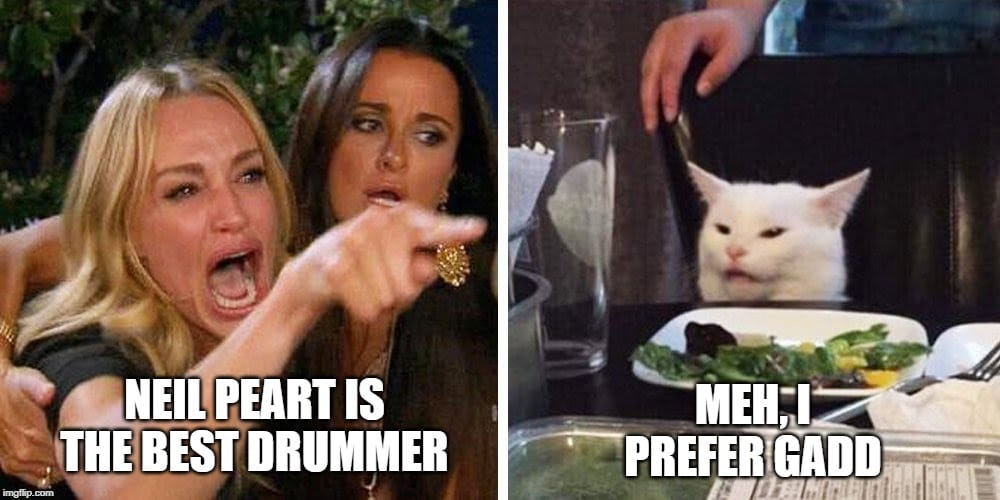
I view drummers on a spectrum rather than a hierarchy, even though I’ve written an article on the best drummers of all time (they’re not in any order).
Neil is incredibly talented; he made Rush the band we know today. However, he also never gave up learning and continued to study drumming and music until the end of his career.
Neil certainly is a very popular drummer. Is there anything wrong with that? In my book, no. On the other hand, he could be overrated in the same sense that the Beatles are overrated.
We all clamor about super-talented drummers who should make it.
“They’re the ones that should be in the spotlight!” Not this guy or gal who can’t drum their way out of a cardboard box!”
That’s different from how it’s ever worked or ever will. Neither is it fair. And unfortunately, it’s not all about talent, especially these days.
Neil Peart was an incredibly talented musician, author, and human being. He made ground-breaking and significant contributions to the world of music, particularly in drumming. His commitment to his craft was unmatched, and his songs were insightful, beautiful, and profound. Although we are all terribly saddened by his passing, his music and soul will never die.

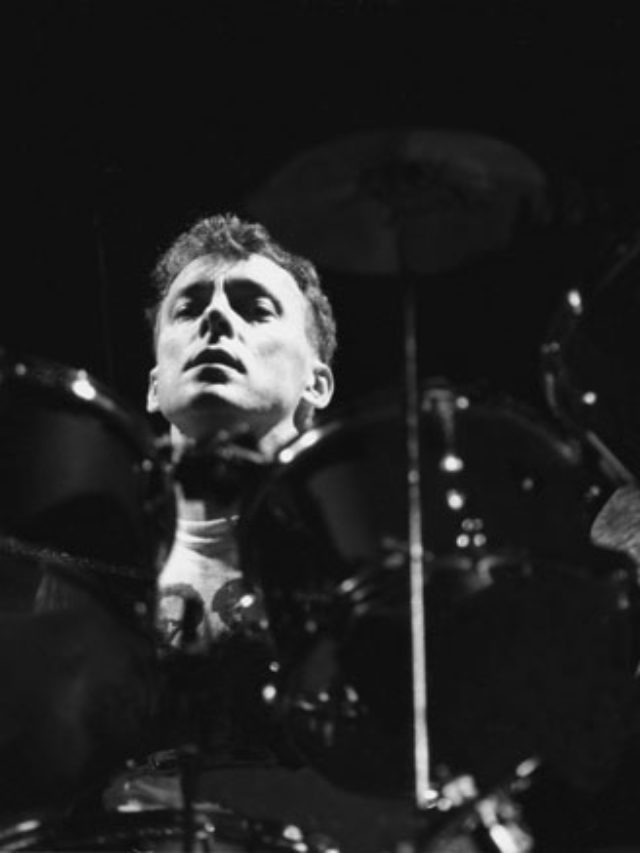



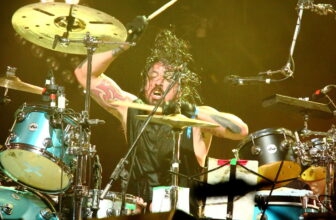


I have seen Rush play from the bottom billing at Winterland to being Top Headliners at numerous venues! All are virtuosos, and Mr. Peart is a Master Percussionist posing as a Rock Fusion Drummer! 🙂 La Villa Strangliato showcases his brilliance. Thank you for the great article, brought back great memories!
I like to watch any drummer who says he’s overrated attempt to play La Villa Strangiato.
Completely agree! That piece was by far one of the biggest challenges when I was learning how to play. I was never close to playing it perfectly but had fun every time.
The words Freddy Gruber (former drummers’ guru) used to describe Neil’s playing were “very compositional.” Even though not the most technical or grooviest of all drummers, Neil will stand out forever as one of the most creative and most influential rock percussionists of all time. Ask Dave Grohl, Taylor Hawkins, Mike Portnoy, Mike Mangini and so on.
Freddy was a gift to the drumming world. I couldn’t agree more with what you said. Well put, Rick!
Basically, anyone who claims Neil is overrated isn’t really someone who knows the craft of drumming. They’re likely just one of those many folks on the internet who get their jollies tearing down people who have done what they can’t do themselves.
As to Neil’s large drum kit, his kit was his vocabulary, and with it he would write a story. You can’t spin a very good tale with 3 or 4 words, thus the large kit.
Being labeled as “best” in anything is so subjective, however anyone who thinks Neil Peart is overrated doesn’t really “listen” to Rush or him in particular. Taylor Hawkins summed up his drumming best, it is song writing. The thought and composition he adds to Rush’s music is second to none. Guitarists get credit for their song composition and a case should be made for drummers as well.
I’ve never heard one person state”I started drums because of Niel Peart.” None. I’ve been in tons of bands in 30 years. Yes. Overrated. Very good, yes. The best? Nah
RIP. To me the greatest aspect of Neil was his humility. Anyone who
watched his instructional video “A Work in Progress” witnessed Neil say
that he felt he was simply an “apprentice.” The real masters to him were
guys like Steve Gadd, Bernard Purdie, etc. But on the other hand, can
you imagine Purdie being the drummer in Rush? It wouldn’t suit the music
that Geddy and Alex wrote. This is why I could never understand the
people who disliked the guy and his playing. He was about the most
humble musician that there ever was. All he said was that drummers
should always strive to get better, and as the 2012 Rush cover story in
Rolling Stone Magazine said, Neil was STILL taking lessons (in this case
from Peter Erskine) in an effort to get better. The drumming world has
NEVER given him the respect he deserves for assembling the Buddy Rich
tribute CD’s and DVD. As Modern Drummer accurately said, Neil was the
only drummer in the entire music industry with the financial &
artistic clout to be able to put together those two amazing tribute
CD’s. So what did jazz fans do? Piss on him. Screw them. Ungrateful,
elitist bastards. Neil said in interview after interview that Rich was
from another world. For me what Neil meant as a drummer is that you
could be a great drummer through sincerity, practice and dedication. He
said many times that he wasn’t naturally gifted. That every drumming
ceiling he crushed through was the result of incredible hard work. But
he gave inspiration to those of us who weren’t like Buddy Rich – guys
who could be great without practicing. I can’t do that. I have to
practice my tail off. I think it is an absolute disgrace that this man
was disliked by so many in the drumming world when all he asked was for
drummers to be the best players they could be. To be artistically
dedicated and to not sell out their music. Rush never did that, and Neil
never did that. He leaves this world with the ultimate legacy: that a
guy with little naturally ability, through hard work and dedication,
could be one of the first drummers elected to the Modern Drummer Hall of
Fame. End of story. To his critics: may you rot in hell.
Neil’s playing and fill technique made Rush who they were. Remember, they were a trio…that’s it. The Cheetah was spot on. Rip Mr. Peart
IMO, it’s not that he is better than anyone else, but that he plays up near his limit. Lots of people can play what Neil plays, or even better. But do they put those tracks down on an album? Usually not. Most rock albums are full of uninspired drumming that I could copy with an hour or two of practice.
If you CAN play a more interesting part, but don’t even try, then you kinda suck. Neil doesn’t suck.
Also, I love Tai Shan.
Me either. However, I’ve heard dozens of people state “I started drums because of Neil Peart.” I did, too, though with more modest results. He wasn’t the exceptional because of his talent or performances; his attitude, or lack thereof, as a drummer, musician, lyricist, composer, and student made him exceptional.
[ My jazz drum teacher, who started playing in clubs before his teens and saw Rich perform live in “the early years”, always spoke of Peart with the highest regard as a “fellow life-long learner of the drum.” ]
Peart’s playing and approach to music influenced the people we’ve known who, in turn, influenced us.
I worked for Neil from 75 until 1980. I was the general manager of Fort Wayne Percussion and Neil bought a Slingerland snare, and a Rogers Supreme hi hat from me, which led me to become a member of Rush’s touring crew. In 1977 I was his drum tech. To know him was to love him believe it or not drums is something he did not who he was…he never was concerned about what others thought of his playing…he didn’t have to.
He was an amazing drummer true, but I will remember him for his books and the fact that he was just a kind person who was quite uncomfortable being considered a celebrity.
Phil Collins
Bill bruford
Terry Bozzio
Simon Phillips..
All of these are not funk drummers per se, nor are they known as Groove masters, like Gadd, Purdie, bla bla bla…but CAN GROOVE !NEIL not
NOT ROBOTIC STIFF FEEL,ALL FLUID
Neil vocabulary’s ALL stolen from Bruford/Collins etc phrases..
Apparently you don’t know much… Just to talk about the 70’s…
Yes(Bruford), Genesis (Collins),UK(Bozzio,Bruford),Mahavishnu (Billy Cobham) etc etc..
They ALL did indeed create it, and Neil himself assumes he caught the influence, but he actually STOLE all of these guys’ patterns and you think he created something up!